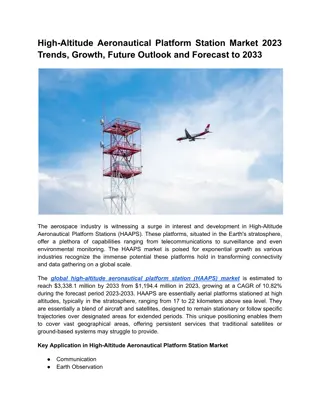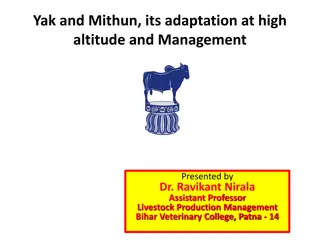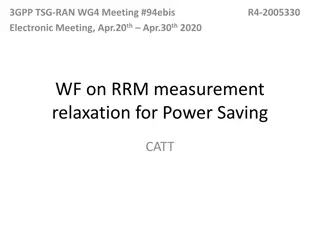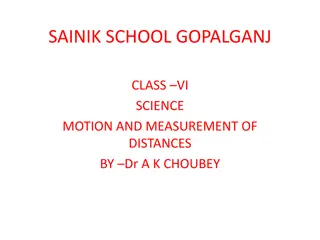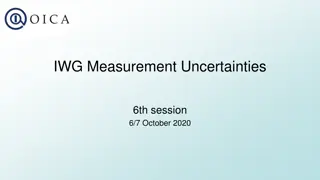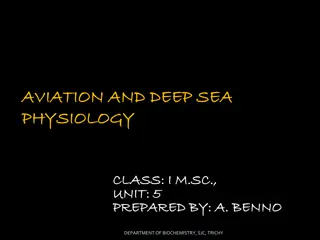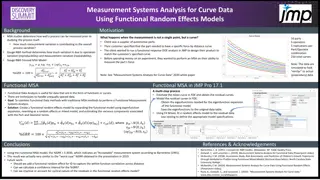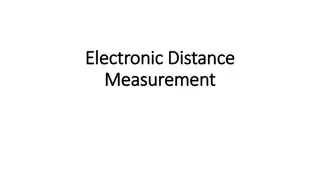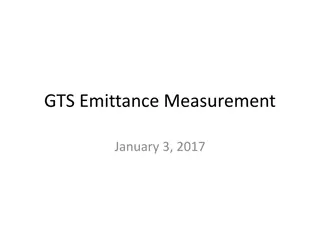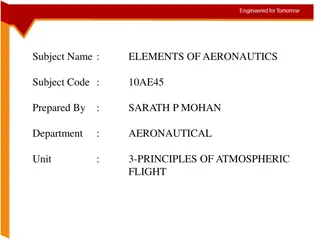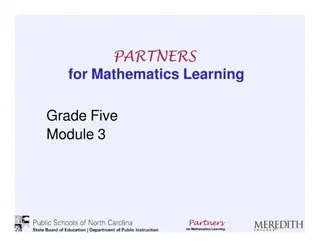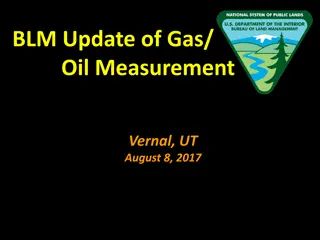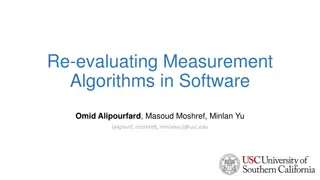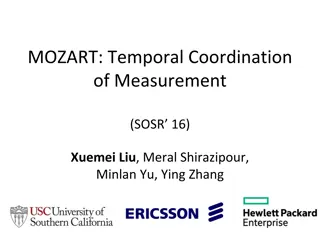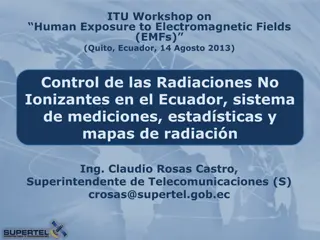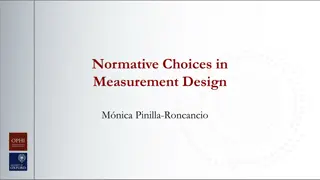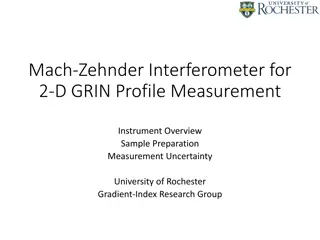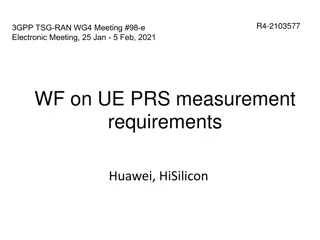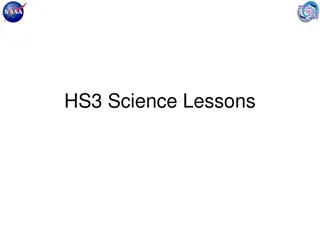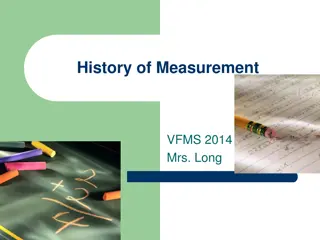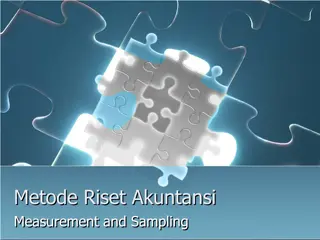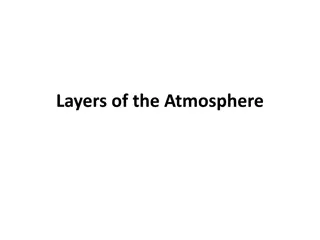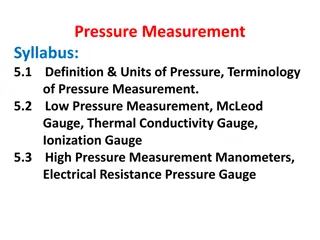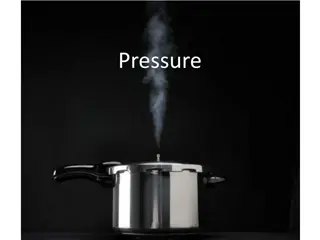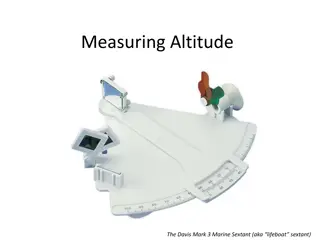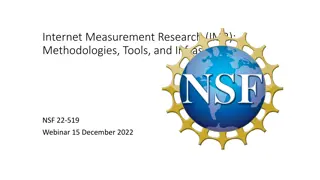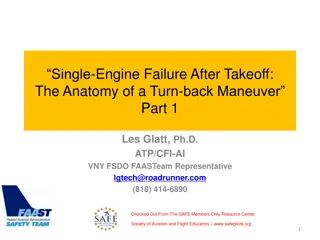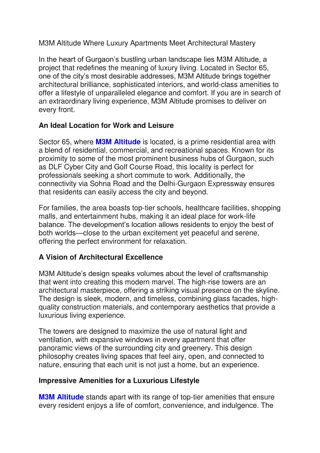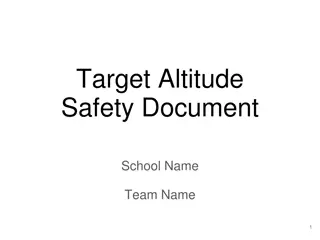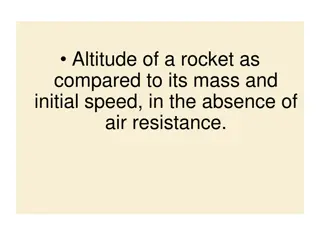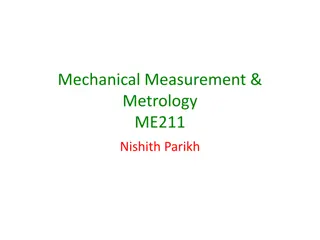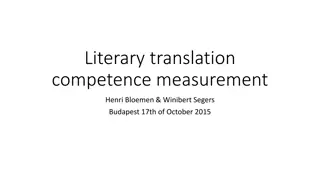High-Altitude Aeronautical Platform Station Market Trends 2023-2033
The global high-altitude aeronautical platform station (HAAPS) market is estimated to reach $3,338.1 million by 2033 from $1,194.4 million in 2023, growing at a CAGR of 10.82% during the forecast period 2023-2033.\nRead Report Overview: \/\/bisresearch.com\/industry-report\/high-altitude-aeronautica
5 views • 3 slides
Understanding Measurement Scales and Scaling Techniques
Measurement scales play a crucial role in marketing research, with techniques like scaling helping to categorize data. The content discusses four types of measurement scales: nominal, ordinal, interval, and ratio, outlining their characteristics and differences. Scaling techniques involve placing re
5 views • 7 slides
Revolutionizing Tertiary Education with ALTITUDE: A Universal Design Initiative
Discover how ALTITUDE is reshaping tertiary education through universal design principles. Gain insights into the policy framework, sectoral commitment, and collaborative efforts driving the project. Learn about the development of the ALTITUDE Charter, strategic foundations, and the significant impa
0 views • 14 slides
Adaptation of Yak and Mithun at High Altitude
Yak and Mithun are domesticated bovids known for their adaptation to high altitudes in the Himalayan region. Yaks, descended from wild yaks, are used for various purposes like transportation, climbing, and trekking. They have specific mating behaviors and unique anatomical modifications for high alt
0 views • 18 slides
RRM Measurement Relaxation for UE Power Saving in 3GPP Meeting #94ebis
This document discusses methods for relaxing RRM measurements to save power in UE devices during idle/inactive states. It covers scenarios with low mobility, non-cell edge, and combinations, suggesting options like longer measurement intervals and relaxing neighbor cell measurement requirements. The
0 views • 7 slides
Understanding Motion and Measurement of Distances in Science at Sainik School Gopalganj
Explore the concepts of motion and measurement of distances in science as taught by Dr. A.K. Choubey at Sainik School Gopalganj. Discover the development of means of transport, different measurement methods like non-standard and standard measures, the significance of measurement, and the Internation
1 views • 16 slides
IWG Measurement Uncertainties: Justification of Impact Quantities
Explore the justification of main impact quantities in IWG Measurement Uncertainties session held on 6th and 7th October 2020. The analysis includes factors such as deviation from centered driving, start of acceleration, speed variations, load variations, background noise, temperature effects on noi
3 views • 25 slides
High-Altitude Physiology and Its Effects on the Human Body
Understanding the impact of high altitudes on human physiology is crucial for aviation and deep-sea activities. Barometric pressures and alveolar oxygen levels change significantly with altitude, leading to hypoxia-related issues. Factors like carbon dioxide and water vapor further affect alveolar o
1 views • 29 slides
Functional Measurement Systems Analysis for Curve Data Using Random Effects Models
Measurement Systems Analysis (MSA) is crucial in determining the contribution of measurement variation to overall process variation. When dealing with curve data instead of single points, a Functional MSA approach using random effects models can be applied. This involves estimating mean curves, mode
0 views • 5 slides
Understanding Electronic Distance Measurement in Surveying
Electronic Distance Measurement (EDM) is a precise method for measuring distances between two points using electromagnetic waves. It offers speed and accuracy, especially useful for long or inaccessible distances. EDM, a type of surveying instrument, measures phase changes in energy waves traveling
0 views • 7 slides
Understanding Measurement and Instruments in Research
Exploring the significance of instruments in research, this content delves into the development and utilization of measures for concepts like caring. It covers the various devices used to measure constructs, the rules governing measurement assignment, direct versus indirect measurement methods, and
2 views • 64 slides
Emittance Measurement Techniques and Analysis
Various emittance measurement techniques like Solenoid and Viewscreen, Single Slit and Viewscreen are discussed in this document along with details on the measurement process, equipment setup, and data analysis methods. Emittance calculations, beamlet intensity profiles, and space-charge dominated b
0 views • 11 slides
Principles of Atmospheric Flight in Aeronautics
This material covers essential topics in aeronautics including the physical properties of the atmosphere, standard atmosphere relationships, Mach number theory, lift and drag principles, stability, control, pressure and temperature variations based on location and solar activity, and the Internation
0 views • 22 slides
Exploring Measurement Challenges and Concepts in Grade Five Mathematics
Delve into a variety of measurement challenges in Grade Five mathematics, including different units, common errors, measurement components, big ideas, accuracy, precision, and the measurement process. Understand the nuances between accuracy and precision, factors affecting measurement accuracy, and
0 views • 39 slides
Update on Gas and Oil Measurement Rules in Vernal, UT
New rules for gas and oil measurement were implemented in Vernal, UT on August 8, 2017. These rules focus on site security, facility measurement points, recordkeeping, and incorporating industry standards. The regulations aim to approve new measurement technology, update standards, and address gaps
1 views • 87 slides
Understanding Barometric Pressure and Its Impact on Altitude
Barometric pressure, also known as atmospheric pressure, is the force exerted by the weight of air on a specific area and varies with altitude. This pressure is crucial in various industries, such as cement production at high altitudes. Learn about how to calculate barometric pressure, its relation
0 views • 37 slides
Re-evaluating Measurement Algorithms in Software Domain
This content explores the importance of measurement algorithms in software, focusing on network function virtualization (NFVs) and software switches. It discusses the critical role of measurement in decision-making for firewall, load balancing, and intrusion detection systems in managing NFVs. The n
0 views • 22 slides
Temporal Coordination of Measurement in Data Centers
Measurement plays a crucial role in data centers for fault diagnosis, traffic engineering, and attack detection. This study focuses on the concept of temporal coordination of measurement to overcome issues like reporting overhead and resource wastage. Various examples illustrate the importance of co
0 views • 29 slides
Understanding Global Ecosystems and Climate Influences
Global ecosystems are defined by dominant vegetation types and are influenced by factors like climate, atmospheric circulation, altitude, relief, and ocean currents. The distribution and characteristics of ecosystems are shaped by global atmospheric circulation patterns, creating distinct belts of v
0 views • 18 slides
Regulation and Measurement Process of Non-Ionizing Radiation Exposure in Ecuador
This content discusses the regulation and measurement methods for non-ionizing radiation exposure in Ecuador, including maximum exposure limits, measurement procedures, and information dissemination to the public. It covers topics such as international recommendations, measurement techniques, data p
0 views • 30 slides
Choices in Measurement Design and National Poverty Assessment
This content discusses normative choices in measurement design, normative reasoning, relevance, usability, essential choices for creating an Alternative Poverty Measure (AF Measure), alongside measurement design considerations, and a purpose statement for a National MPI. It emphasizes the importance
0 views • 33 slides
Mach-Zehnder Interferometer for 2-D GRIN Profile Measurement
Mach-Zehnder Interferometer is a powerful tool used by the University of Rochester Gradient-Index Research Group for measuring 2-D Gradient-Index (GRIN) profiles. This instrument covers a wavelength range of 0.355 to 12 µm with high measurement accuracy. The sample preparation involves thin, parall
0 views • 6 slides
Understanding Television Research: Markets, Measurement, and Methodologies
Explore the world of television research through topics such as television markets, measurement approaches, local measurement services like Nielsen and Comscore, and Nielsen's measurement methodologies. Learn about Designated Market Areas (DMAs), Household Demographics, People Meters, Portable Peopl
0 views • 42 slides
UE PRS Measurement Requirements Discussion at 3GPP TSG-RAN WG4 Meeting #98-e
Discussion at the 3GPP TSG-RAN WG4 Meeting #98-e focused on UE PRS measurement requirements. The topics included consideration of muting in measurement periods, periodicity scaling for PRS resources, handling different resource periodicities, and offsets in measurement periods. Various options were
0 views • 18 slides
High Altitude Science Flight Operations Report
Critical observations from recent high altitude science flight operations include aircraft limitations, airspace access challenges, scheduling issues, and procedural concerns. Key points highlight the inability of AV-1 to maneuver storms, communication successes during unexpected events, flight fail
0 views • 11 slides
Evolution of Measurement Systems Over Time
Explore the fascinating journey of measurement systems from historical units like cubit and fathom to the modern metric system. Discover how civilizations developed standardized units for length, weight, and mass. Follow the timeline of measurement advancements, from King Edward's iron ulna to the b
0 views • 36 slides
Understanding Accounting Research Methods: Measurement and Sampling
Measurement is a crucial aspect of research in accounting. It involves assigning numbers to empirical events, objects, or properties. Measurement consists of selecting measurable phenomena, developing mapping rules, and applying these rules appropriately. The process of measurement includes determin
0 views • 63 slides
Exploring Layers of Earth's Atmosphere
Earth's atmosphere consists of five major layers, each with unique properties and temperature changes with altitude. The troposphere, closest to the Earth's surface, experiences a temperature decrease with altitude due to heat from the sun and Earth's surface. Learn about the properties of the tropo
0 views • 26 slides
Comprehensive Guide to Pressure Measurement Methods
This comprehensive guide delves into the definition, units, and terminology of pressure measurement, covering low and high-pressure measurement techniques such as McLeod Gauge, Thermal Conductivity Gauge, Ionization Gauge, Manometers, and Electrical Resistance Pressure Gauge. It also explores the re
0 views • 56 slides
Understanding Pressure, Altitude, and Temperature Activities
Exploring the concepts of pressure, altitude, and temperature through engaging activities like observing air pressure at sea level, experimenting with vacuum chambers and boiling water, and understanding the relationship between force, area, and pressure.
0 views • 9 slides
Production and Measurement of Beryllium-10 in Quartz
Beryllium-10 (10Be) is produced through cosmic ray spallation and muon-reduced reactions, with production rates influenced by factors like altitude and latitude. Measurement involves accelerated mass spectrometry on pure quartz samples, where the ratio of 10Be/9Be is determined relative to a standar
0 views • 12 slides
Navigating the Seas with a Sextant: Altitude Measurement
Explore the art of measuring altitude using a Davis Mark 3 Marine Sextant. Learn about correcting index errors, taking stellar and solar sights, and reading a sextant for accurate navigation at sea.
0 views • 9 slides
Advancing Internet Measurement Research: IMR Program Overview
The Internet Measurement Research (IMR) program aims to enhance Internet measurement methodologies, tools, and infrastructure for a comprehensive understanding of wired and wireless networks. It promotes the development of new data collection methods, measurement tools, and related infrastructure. T
0 views • 23 slides
Understanding the Importance of the Turn-back Maneuver in Aviation
Exploring the critical aspects of executing a successful turn-back maneuver after an engine failure during takeoff, this article delves into the factors influencing pilot decisions, the controversy surrounding altitude requirements, and the geometric and aerodynamic complexities involved. Knowing th
0 views • 44 slides
M3M Altitude Where Luxury Apartments Meet Architectural Mastery
In the heart of Gurgaon\u2019s bustling urban landscape lies M3M Altitude, a project that redefines the meaning of luxury living. Located in Sector 65, one of the city\u2019s most desirable addresses, M3M Altitude brings together architectural brilli
0 views • 3 slides
Rocket Design and Safety Documentation for Altitude Targeting
This document outlines the detailed design and safety considerations for a rocket targeting a specific altitude. It covers materials used, rocket components and dimensions, motor selection and simulation, recovery system details, and electronic recovery mechanisms. Emphasis is placed on compliance w
0 views • 6 slides
Rocket Altitude Comparison Activity
Explore a visual activity comparing the altitude of rockets based on their mass and initial speed in the absence of air resistance. Test your understanding by identifying which rocket will reach the highest point among different scenarios. Engage in a hands-on learning experience to grasp the relati
0 views • 29 slides
Mechanical Measurement & Metrology ME211 Teaching Scheme and Syllabus
Teaching scheme includes lectures and labs schedule, continuous examination plan, evaluation criteria, internal assessment, and syllabus covering measurement concepts, linear and angular measurement, gear terminology, measurement of mechanical parameters, and miscellaneous metrology topics. Recommen
0 views • 18 slides
My Measurement Assistant 4.0 - The Future of Self-Service
My Measurement Assistant 4.0 is a cutting-edge self-service application designed to enhance customer experience and support for ABB measurement devices. It offers a wide range of features such as spare parts identification, error code identification, temperature performance estimation, and remote su
1 views • 34 slides
Understanding Competence Measurement in Literary Translation
Exploring the concept of competence measurement in literary translation, this text delves into the ELV competence model, a five-step scheme for measurement, reliability versus validity, and the relationship between competence measurement and translation product evaluation. It discusses the importanc
0 views • 18 slides
